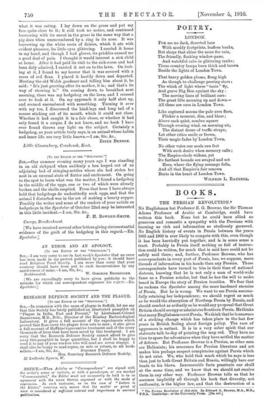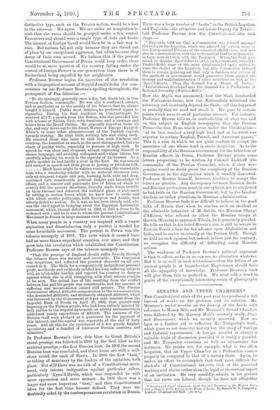BOOKS.
THE PERSIAN REVOLUTION.* No Englishman but Professor E. G. Browne, the Sir Thomas Adams Professor of Arabic at Cambridge, could have written this book. None but he could have allied so, generous and romantic a sympathy with the Persians with learning so rich and information so studiously garnered. No English history of events in Persia between the years 1905 and 1909 is ever likely to compete with this, even though it has been hurriedly put together, and is in some sense a, tract. Probably in Persia itself nothing so full of instruc- tion could be written, for much that is said here could not be safely said there ; and, further, Professor Browne, who has correspondents in every part of Persia, has, we suppose, more threads of information in his hands than any Persian. These correspondents have turned to him in their time of national distress, knowing that he is not only a man of world-wide fame as a Persian scholar, but that he has the will to make. heard in Europe the story of Persian troubles. We fear that he reckons the Spectator among the more hardened enemies. of Persia. But he is wrong. We want to see Persia success- fully retaining her independence; we should regret as much as he would the absorption of Northeig Persia by Russia, an& should combat as ardently as he would any proposal that Great Britain should occupy or administer Southern Persia. He thinks Lb at many Englishmen covet Persia. We think that he is unaware of a striking change which has taken place in the last few years in British feeling about foreign policy. The race of aggressors is extinct. It is in a very sober spirit that our stalwarts talk to-day of painting the map red. They have no time to spare for adventures when they have settled the matter of defence. But Professor Browne is a Persian, as other men are Hellenists ; his reverence for Persian literature and art makes him perhaps suspect conspiracies against Persia which do not exist. We, who hold that much which he says is less, than just to both Great Britain and Russia, willingly bare our heads to his blows. Innumerable facts penetrate our skull at the same time, and we know that we should not receive them in any other way. Professor Browne tells us that he assumes implicitly all through his book that diversity, not uniformity, is the higher law, and that the destruction of a • The Persian Revolution of loos-ma. By Edward G. Browne, MA., M.D., F.B.A. Cambridge at the University Press. 1108. net.]
distinctive type, such as the Persian nation, would be a loss to the universe. We agree. We are under no temptation to wish that the races should be grouped under a few central Executives and should wear a single type of hats and boots. The interest of foreign travel would then be in a fair way to ruin. But nations fall not only because they are thrust out of place by an exceptional aggressor, but often because they decay of their own accord. We believe that if the present Constitutional Government of Persia could keep order, there would be no more question of the country falling under the control of foreign Powers in our generation than there is of Switzerland being engulfed by her neighbours.
Professor Browne begins his narrative of the revolution with a biographical account of Sayyid Januilu'd-din (for con- venience we use Professor Browne's spelling throughout), the protagonist of Pan-Islamism :— " He ate sparingly, generally once a day, but drank tea, in true Persian fashion, continually. He was also a confirmed smoker, and so particular as to the quality of his tobacco that he always bought it himself. Unlike most Asiatics, he preferred cigars to cigarettes. During his final residence in Constantinople he received £75 T. a month from the Sultan, who also provided him with a house at Nishtin 'Nish, with furniture, and a carriage and horses from the Royal stables. He generally stayed at home all day, and only drove out to the Sweet Waters of Europe (Kycighid- Shane), or some other pleasure-resort of the Turkish capital, towards evening. He slept little, retiring late and rising early. Ile received those who came to visit him with kindness and courtesy, the humblest as much as the most distinguished, but was chary of paying visits, especially to persons of high rank. In speech he was clear and eloquent, always expressing himself in choice language, and avoiding colloquial and vulgar idioms, but carefully adapting his words to the capacity of his hearers. As a public speaker he had hardly a rival in the East. He was serious and earnest in speech and little given to jesting or frivolous talk.
Much more might be written concerning this remarkable man, who, a wandering scholar with no material resources save only an eloquent tongue and pen, learning both wide and deep, combined with considerable political insight and knowledge of affairs, and a sincere and passionate love of Islam, of which he acutely felt the present decadence, literally made kings tremble on their thrones and defeated the well-laid plans of statesmen by setting in motion forces which he knew how to evoke and with which secular politicians, both European and Asiatic, had utterly failed to reckon. He it was, as has been already said, who was the chief agent in bringing about the Egyptian Nationalist movement, which, though defeated in 1882, is still a force to be reckoned with ; and he it was to whom the present Constitutional Movement in Persia in large measure owes its inception."
When many people in a country are inspired with a vague aspiration and dissatisfaction only a pretext is needed for some formidable movement. The pretext in Persia was the tobacco monopoly of 1891. The riots which it caused have had no more than a superficial cessation ever since, and they grew into the revolution which established the Constitution. Professor Browne says of the tobacco monopoly :—
"That the prestige of England should suffer heavily through the tobacco fiasco was natural and inevitable. The Concession was iniquitous, and reflected the greatest discredit on all con- cerned in it. The Shah, for a comparatively insignificant personal profit, needlessly and recklessly saddled his long-suffering subjects with an intolerable burden and exposed his country to dangers against which she is still struggling, with what success remains to be seen. The actual loss of life resulting from the conflict between him and his people was considerable, and the amount of suffering and inconvenience caused still greater. The Persian Government offered £300,000 compensation to the concessionnaires, who demanded 4650,000, and ultimately obtained £500,000, which was borrowed by the Government at 6 per cent, interest from the Imperial Bank of Persia on April 27, 1892, thus gratuitously imposing on the Persian people, who had been entirely ignored by both parties to the original agreement, an utterly unremunerative additional yearly expenditure of 230,000. The customs of the Persian Gulf were pledged as a guarantee for the payment of this interest, and the capital was repayable at the end of forty years. And all this for the enrichment of a few greedy English speculators and a handful of traitorous Persian courtiers and ministers."
In Professor Browne's view, this blow to Great Britain's moral prestige was followed in 1900 by the first blow to her material prestige,—the first Russian loan. In 1902 the second Russian loan was concluded, and these loans are still a mill- stone round the neck of Persia. In 1905 the first "bast," or taking of sanctuary by the leaders of the agitation, took place. But still there was no talk of a Constitutional move- ment, only intense indignation against particular rulers, particularly 'Aynu'd-Daula, which was responded to with more oppression and more menace. In 1906 there was a larger and more important "bast," and then Constitutional ideas for the first time became defined. They were un- doubtedly aided by the contemporaneous revolution in Russia.
There was a large number of " bastis " in the British Legation, and Taqi-zzida—the attractive and heroic Deputy for Tabriz—.
told Professor Browne how the Constitutional idea took shape :—
" Taqi-zida told me that a Commission was formed amongst the bastis in the Legation, which was advised by certain more or less Europeanized Persians of the educated official class, and was also in communication with the ecclesiastical leaders at gum,who, in turn, were in touch with the Provinces. When tho Shah pro- mised to dismiss Aynu'd-Dawla (who, on his dismissal, retired to Puslit-i-litih), some of the more simple-minded bastis wished to leave the shelter of the Legation, but this Connnission induced them to remain, pointing out that only a fundamental reform of the methods of government would guarantee them against the tyranny and maladministration of other ministers as bad as the Aynu'd-Dawla. Thus the demand for a 'House of Justice' Adcilat-khana) developed into the demand for a Parliament or National Assembly (Majlis-i-Milli)."
How the Muftis was summoned, how the Shah bombarded the Parliament-house, how the Nationalists withstood the autocracy and eventually deposed the Shah,—all this happened
so recently that we need not recall it. We pass to certain points which seem to us of particular interest. For instance, Professor Browne tells us, in contradiction of what was said on this subject in English newspapers, that the Persian Press—the free Press which arose under the Constitution- " at its best reached a very high level, and at its worst was superior to certain English, French, and American papers."
This is a case in which we are quite content to accept the assurance of one whose word is above suspicion. As to the responsibility of the Russian Government for the behaviour of Russian officers in Persia, Professor Browne prints some- letters purporting to be written by Colonel Liakhoff (the commander of the Persian Cossacks), which if they were genuine would no doubt prove the complicity of the Russian
Government in the aggressions which it steadily disavowed. Professor Browne himself, however, hesitates to accept the letters as genuine. Any discrepancy between Russian deeds and Russian professions must, in our opinion, not be attributed to bad faith in the Russian Government, but to the familiar dualism, or rather pluralism, in Russian administration.
Professor Browne finds it so difficult to believe in the good faith of Russia that when he reaches such an incident aa
the admirable behaviour of M. Sablin, the Russian Chargti • d'Affaires, who refused to allow the Russian troops at Qazwin (Kazvin) to approach Tihran, he is genuinely puzzled. He tells us that in his belief Russia's aim is still to secure hi Eastern Persia a base for her advance upon Afghanistan and
India, and to arrive eventually at the Persian Gulf. Though we hold no such opinion, but, indeed, believe just the contrary, we recognise the difficulty of defending many Russian actions.
The weakness of Professor Browne's political argument is that it offers, so far as we can see, no alternative whatever. But it is as well in such a situation—when the future of an ancient people is at hazard—that Englishmen should have all the sympathy of knowledge. Professor Browne's hook will give them this to perfection. We must add a word in praise of the exceptionally interesting series of photographs.



































































 Previous page
Previous page